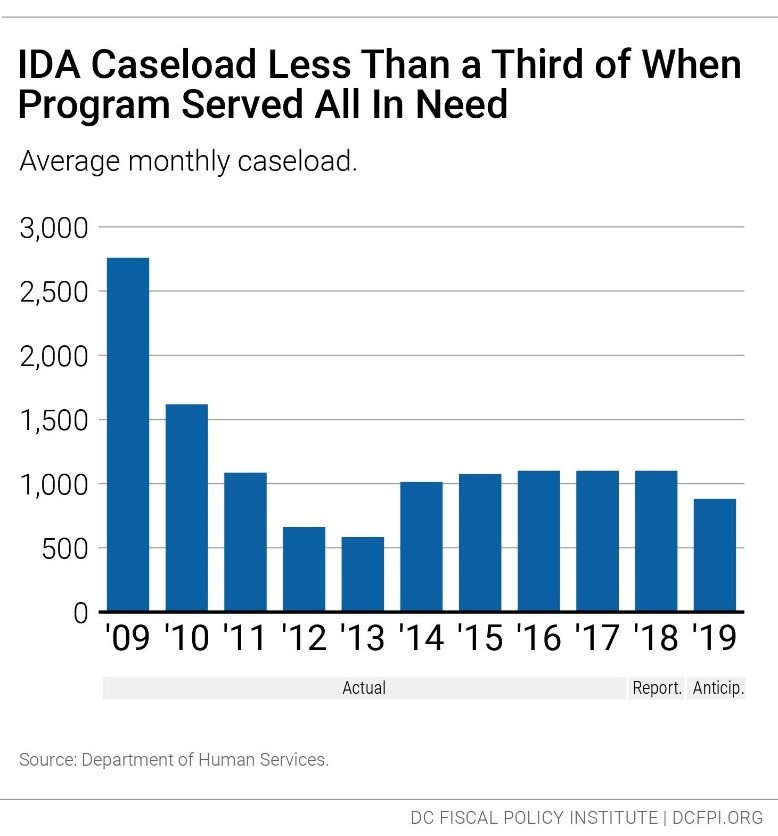Last week DCFPI testified at the Performance Oversight Hearing for the Department of Human Services (DHS) to encourage the Mayor and Council to include funding for two critical DHS programs in the fiscal year (FY) 2020 budget: Interim Disability Assistance (IDA) and the SSI/SSDI Outreach, Access, and Recovery (SOAR) program.
IDA Not Reaching All Who Need It
Interim Disability Assistance (IDA) serves as a vital lifeline for DC residents with disabilities who cannot work and have no other income or other means to support themselves. It provides modest, temporary cash benefits to adults who have applied for federal disability benefits (Supplemental Security Income (SSI) or Social Security Disability Insurance (SSDI)) and are awaiting an eligibility determination. The wait time for federal benefit determination has skyrocketed in recent years, from 350 days in 2012 to nearly 600 days in 2017, leaving residents too sick to work but lacking benefits.[1]
IDA is paid for with a combination of local funding, reimbursement from the federal government, and funds from the SSI Payback Fund. When an individual is approved for SSI, the federal government reimburses the District for the IDA benefits the individual received. These reimbursement dollars are used to support the annual budget, and unspent funds are put into the SSI Payback Fund at the end of the year so the District can provide benefits for future IDA applicants.
Unfortunately, in past years, funds have been taken out of the SSI Payback Fund for other purposes, reducing the number of IDA recipients who can be served. More than $1.3 million was repurposed in the FY 2018 budget for non-IDA purposes. This left the District with only $19,000 in the fund balance. Combined with a reduction to the anticipated annual federal reimbursement,[2] it is estimated that 415 fewer residents will receive benefits in FY 2019 than in FY 2018. This caseload is less than 25 percent of what it was when all those in need received benefits, around 2,750 residents in FY 2009 (Figure 1). DCFPI recommends that the Mayor and Council add additional funding to IDA over the next four years to bring the IDA caseload to the 2009 level.

SOAR: Ensuring Residents Experiencing Homelessness Access Needed Benefits
SSI/SSDI Outreach, Access, and Recovery (SOAR) is an evidence-based, national best practice model designed to increase access to disability benefits for adults who are experiencing or at-risk of homelessness. The model was developed because nationally only about 14 percent of individuals experiencing homelessness are approved on initial application for these benefits.
In the past three years, the District has started supplementing privately funded SOAR efforts by providing local funds through the Department of Human Services (DHS) and federal funds through the Department of Behavioral Health (DBH). After some early implementation challenges, this new funding is paying off. DC SOAR has helped 73 percent of SSI applicants receive approval upon their initial applications, compared to a 65 percent national SOAR rate. Applications for assistance through SOAR increased from 48 in 2016 to 86 in 2017 to 113 in 2018. Recognizing these great results, the Substance Abuse and Mental Health Services Administration (SAMHSA) SOAR Technical Assistance Center named DC one of the “Top 10” in 2017 and in 2018.
We thank DHS for finding one-time local funding to support pay for performance SOAR contracts in FY 2019. Looking to FY 2020, we are concerned about the absence of these funds as they are one time and the loss of federal funds that are currently distributed through DBH. All federal Cooperative Agreements to Benefit Homeless Individuals (CABHI) grant funds are expected to be expended as the grant expires in FY 2019, leaving a gap for FY 2020. The Mayor and the Council should work together to fill this gap.
[1] “597 Days and Still Waiting.” Terrence McCoy. The Washington Post. 11 Nov. 2017. http://www.washingtonpost.com/sf/local/2017/11/20/10000-people-died-waiting-for-a-disability-decision-in-the-past-year-will-he-be-next/
[2] In the past few years, federal reimbursement has been budgeted at $1 million but the District has only received $800,000. So, the FY 2019 budget reduced from FY 2018 to reflect this lower reimbursement

